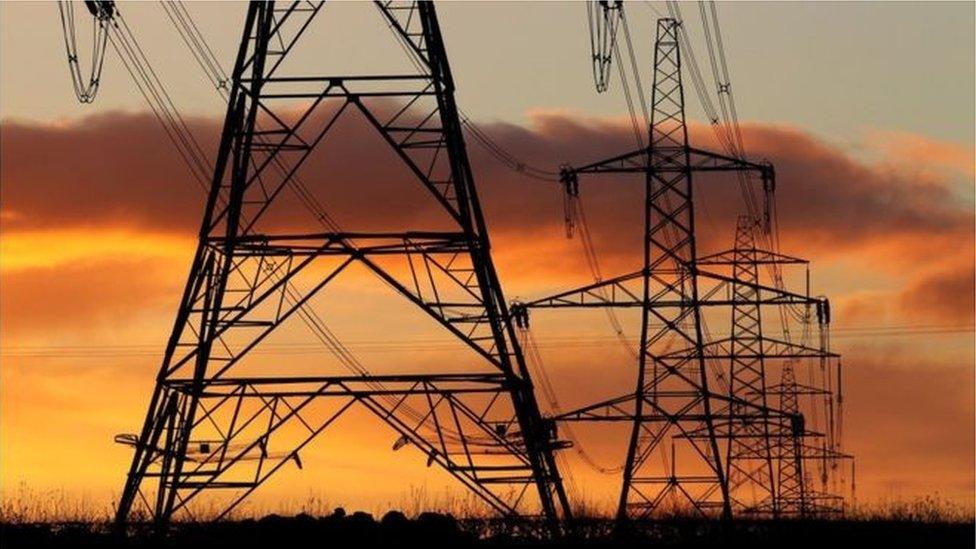General election 2017: Energy industry distrusts Tory price cap
- Published

Members of the UK energy industry say that a Tory manifesto pledge to cap household bills is not in customers' best interests.
Full details are not yet known, but it is thought the cap would probably be on standard variable tariffs (SVT).
But British Gas parent firm Centrica, and fellow supplier E.On both said market competition was essential.
And trade association body Energy UK said a cap could risk "billions in investment and jobs".
'Deadline'
Scottish Power said that if the Conservatives were going to intervene it would be better to abolish standard variable tariffs, which they said were the cause of the problem not just the symptom of current price pressure.
"As Scottish Power recommended to the Competition and Markets Authority, a deadline should be set to abolish SVT so that all customers can engage even more in the competitive market."
There were further misgivings from price comparison site uSwitch.com which said "heavy-handed" price intervention could have the unintended effect of leaving consumers worse off.
A price cap has already been introduced for households using pre-payment meters earlier this month - prompted by the release of a report by the Competition and Markets Authority which said customers were overpaying by £1.4bn.
But that report also said it had been found that previous market interventions in the energy sector had contributed to lower switching rates and "softening competition".

Analysis: Joe Lynam, BBC business correspondent
After a two-year-long investigation, the Competition and Markets Authority published its final report last June into the energy sector. Much to the chagrin of those who feel that Britain's energy market is rigged and that prices are unnecessarily high, the CMA found that competition was in fact working.
It suggested a number of remedies to improve things but steered clear of outright price caps - with the exception of the pre-paid energy meter market.
The government, regulators and especially smaller energy firms are all agreed that regular switching is the key to driving up competition and driving down prices. And although a record 7.7 million people changed their energy suppliers last year, 56% of households still have never switched.
After the Conservatives suggested some sort of price caps, the aggregators uSwitch said that caps would do more harm than good because it would lead to even fewer people switching energy suppliers, because they may feel changing to be no longer necessary.
The law of unintended consequences would prevail again.

Under the price cap being promised by the Conservatives, consumers will benefit if wholesale prices fall.
But the Tories say that their policy is different from one proposed by Labour under its former leader, Ed Miliband.
"We would have [market watchdog] Ofgem setting the limit, so it would be a cap, so it would be more flexible, it would be able to reflect market conditions - so the market would still have an influence," the Work and Pensions Secretary, Damian Green, told ITV's Peston on Sunday.
"And that would mean in practical terms that if the oil price fell again then consumers would benefit in a way they wouldn't have done under Ed Miliband's proposal."
'Profits are flat'
Iain Conn, chief executive of Centrica, which owns British Gas, said the UK energy market was highly competitive, with more than 50 suppliers.
"Price regulation will result in reduced competition and choice, stifle innovation and potentially impact customer service," he said.
He said his firm's average dual-fuel bills over the decade since 2007 had increased by just over 3% per annum, or £273 per household.
He said of this figure, transmission, distribution and metering cost increases have been about £150, and environmental and social policy costs about £100.
"Our profits have been flat to slightly falling. Increases have been because of the costs of changing the energy system and policy costs, not profiteering from suppliers."
Energy firm E.On said it did not want to comment on the government's proposal without seeing the full details.
But they added: "We firmly believe that engaged consumers and a competitive market are the best way to deliver for customers."
Magic bullet?
Meanwhile Lawrence Slade, chief executive of Energy UK, said that last year the government's competition regulator decided against introducing a wider price cap, instead opting for the pre-payment cap.
"Intervening further would undermine so many of the positive changes that we are seeing in the retail market. It would be giving up on competition, and at a time when we need engaged consumers more than ever.
"Intervention on this scale will additionally create huge uncertainty around government intentions, potentially putting at risk the billions in investment and jobs needed to renew our energy system.
He added that competition should drive innovation, while ensuring that there was targeted support for those customers most in need.
And Richard Neudegg, head of regulation at uSwitch.com, said a price cap on standard variable tariffs "would do more harm than good".
"Price caps may sound like a magic bullet, but heavy-handed price intervention could have the unintended effect of leaving consumers worse off.
"Instead of lowering bills, previous market interventions in the energy sector have led to lower switching rates and higher prices - a finding backed by the Competition and Markets Authority in its energy market investigation."
Energy firms Npower and EDF said they would not be making a response at the moment.
- Published23 April 2017
